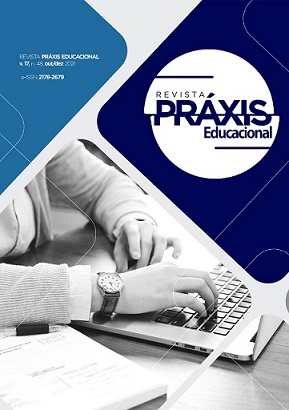Competences for education for sustainability: analysis of educational policy documents in Portugal
DOI:
https://doi.org/10.22481/praxisedu.v17i48.8848Keywords:
Key competences, Sustainability, Portuguese Policy DocumentsAbstract
The present study is part of the TEDS - Teacher Education for Sustainability project. This is an Erasmus+ project and involves five European countries: Portugal, France, Lithuania, Finland and Malta. The main aim of the TEDS project is to provide European teacher educators and teachers with the knowledge and tools necessary to implement an education that promotes sustainability in their practices. Within this project, one of the objectives was to understand how key competences in education for sustainability are present in the educational documents of each of the participating countries. This article refers to the analysis carried out on Portuguese educational documents. It is a qualitative study framed on the interpretive paradigm. It is an exploratory, descriptive-interpretive study aimed at identifying and describing the main characteristics related to the key competences in education for sustainability present in the official Portuguese documents that guide teaching and learning. After the analysis, validation and discussion of the results of the content analysis carried out on the corpus, these seem to indicate that the educational documents analyzed are compatible with the key competences considered in the guiding reference framework. All documents present different aspects of the various competences, highlighting their importance in the foundation of an educational practice that promotes sustainability.
Downloads
Metrics
References
BAMBER, P. (Ed.). Teacher Education for Sustainable Development and Global Citizenship: Critical Perspectives on Values, Curriculum and Assessment. New York: Routledge, 2019.
BARDIN, L. Análise de Conteúdo. Lisboa: Edições 70, 2014.
COSTA, A. P. & AMADO, J. Análise de conteúdo suportada por software. Aveiro: Ludomedia, 2018.
ELO, S. & KYNGAS, H. The Qualitative content analysis process. Journal of Advanced Nursing 62(1), p. 107–115, 2008.
de HAAN, G. The BLK '21' programme in Germany: A 'Gestaltungskompetenz'-based model for Education for Sustainable Development. Environmental Education Research: Environmental education in three German-speaking countries: Research perspectives and recent developments, 12(1), p. 19–32, 2006.
EUROPEAN COMISSION. Communication from the Euroepan Parliament, the Council, the European Economic and Social Committee and the Committee of the Regions. A New Circular Economy Action Plan. For a cleaner and more competitive Europe. COM(2020)98 final. Brussels, 2020.
FREY B. The SAGE Encyclopedia of Educational Research, Measurement, and Evaluation. SAGE: Los Angeles, 2018.
GTEC. Estratégia Nacional de Educação para a Cidadania. ME-DGE, 2017.
HSIEH, H. & SHANNON, S. E. (2005). Three Approaches to Qualitative Content Analysis. Qualitative Health Research, 15(9), p. 1277–1288, 2005.
JUUTE, K. (ORG.). Framework for Education for Sustainability: Enhancing Competences in Education. Aveiro: UA Editora, 2021.
LEI DE BASES DO SISTEMA EDUCATIVO, Lei nº 46/86
ME-DGE. Perfil dos Alunos à Saída da Escolaridade Obrigatória. Ministério da Educação e Ciência, Lisboa, 2017.
PEDROSO, J. V. (Coord). Referencial de Educação Ambiental para a Sustentabilidade. ME-DGE, 2018.
SILVA, I., MARQUES, L., MATA, L. & ROSA, M. Orientações curriculares para a Educação Pré-Escolar. ME-DGE, 2016.
WCED. Our Common Future. New York: Oxford University Press, 1987.
WIEK, A., WITHYCOMBE, L., & REDMAN, C. L. Key competencies in sustainability: a reference framework for academic program development. Sustainability science, 6(2), p. 203-218, 2011a.
WIEK, A., WITHYCOMBE, L., REDMAN, C., & MILLS, S. B. (2011b). Moving forward on competence in sustainability research and problem solving. Environment, 53(2), p. 3-13, 2011b.
WIEK, A., BERNSTEIN, M., FOLEY, R., COHEN, M., FORRES, N., KUZDAS, C., KAY, B., & WITHYCOMBE, KEELER, L. Operationalising competencies in higher education for sustainable development. In M. BARTH, G. MICHELSEN, M. RIECKMANN, I. THOMAS (Eds.) Handbook of Higher Education for Sustainable Development. Routledge, London, p. 241-260, 2015.
UNESCO. Education for the Sustainable Development Goals. Learning Objectives. Paris: UNESCO, 2017.
UNESCO. Global Action Programme on Education for Sustainable Development. Paris: UNESCO, 2018.
UNESCO. Teacher Policy Development Guide. Paris: UNESCO, 2019.
Downloads
Published
How to Cite
Issue
Section
License
Copyright (c) 2021 Práxis Educacional

This work is licensed under a Creative Commons Attribution-ShareAlike 4.0 International License.
You are free to:
Share - copy and redistribute the material in any medium or format; Adapt - remix, transform, and build from the material for any purpose, even commercially. This license is acceptable for Free Cultural Works. The licensor cannot revoke these freedoms as long as you follow the terms of the license.
Under the following terms:
Attribution - You must appropriately give credit, provide a link to the license, and indicate if any changes have been made. You may do so in any reasonable way, but not in a way that suggests that you or your use is endorsed by the licensor.
There are no additional restrictions - You cannot apply legal terms or technological measures that legally restrict others to make any use permitted by the license.










